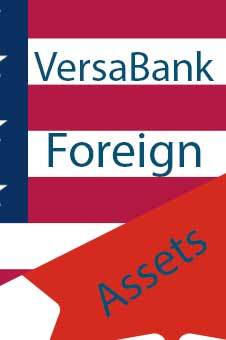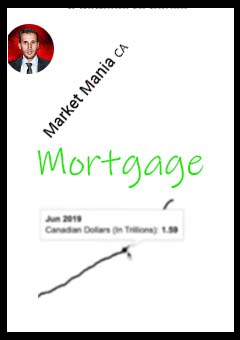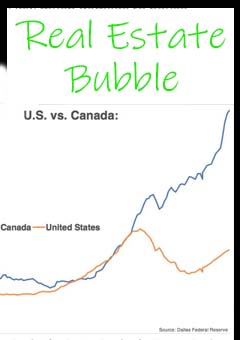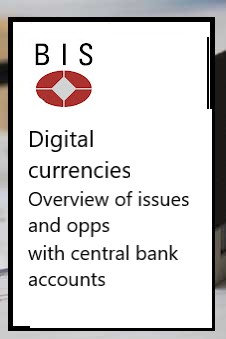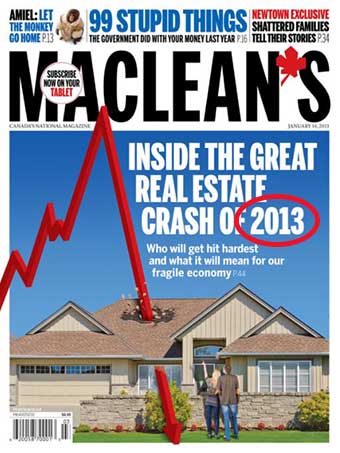Foreign assets held by Canadian banks overview document
Foreign assets held by Canadian banks overview document (2).pdf
Mark Sibthorpe
Canadian banks, apart from the Big 5, have generally avoided foreign diversification. All of the Big 5 have a significant foreign presence, however, RBC’s massive diversifactation ($1.86T foreign assets, 37% revenue) eclipses its rivals. Whereas, National Bank has also proven highly competitive, despite its domestic focus.
Methodology
This document looks at 4 categories of Canadian banks via charts. The charts are derived from OSFI data which provides details with respect to foreign operations held by Canada’s domestic banks. I have categorized them as Small/Medium, Mid-Tier, Large and Big 5.
The purpose is to provide a snapshot on foreign diversification and to demonstrate how banks have benefited from diversification. I summarize the how, why and where for each of the banks that met the criteria, and to determine the impact on revenue and risk management.
Part 2: The Merchant Loyalty Industrial Complex Collapse
Credit_cards_Part_2v4.pdf
Mark Sibthorpe
Since November 2, 2021, Loyalty Ventures Inc.'s (Airmiles) market cap has decreased from $861.42M to $2.11M, a decrease of -99.75%. This compares closely to 2018, when Aimia sold Aeroplan back to Air Canada and partners TD and CIBC for $238 million. For reference, in 2005 Aeroplan launched an IPO valuing it at $2 billion. Related to Aimia’s downfall, it had also previously sold the UK Nectar program to Sainsburys for $120 million, $580 million lower than it paid for Nectar in 2007.
This report digs under the surface and uncovers why loyalty is going the way of the dodo.
Merchants should not waste time fighting card networks
Card_fees_ongoing.pdf
Mark Sibthorpe
This is part one of a two part assessment of merchant frustration due to high credit card fees. The second part of this report will outline an alternative approach that merchants can consider. An approach that is a win for them and also for the card networks.
The full story of SVB March 12th, 2023
SVB_special_report2.pdf
Mark Sibthorpe
Aggregated news and research related to SVB. Apart from SVB, included in this report is related news with respect to other banks and non-traditional companies looking to add financial services that also appear risky.
March 2023 bank earnings summary
bankearningsfriday.pdf
Mark Sibthorpe
This report provides a snapshot into recent bank earnings and related news as published in fsim.ca reports.
Real estate report: October 30th, 2020
Oct30rereportv1.pdf
Mark Sibthorpe
The big buzz in real estate recently is Mark Carney being scooped up by Brookfield. This means more juice for riskier borrowers. Brookfield, a huge player in real estate, both residential and commercial, recently bought its remaining shares from Sagen (Genworth MI Canada), which values the company at $3.8 bn.
VersaBank’s New High-Security VPN Proving Especially Valuable During COVID-19 Pandemic
TailscaleReleaseMarch30FINAL.pdf
Press Release
VersaBank (TSX:VB) (“VB” or the “Bank”) today announced the implementation of its new high security Virtual Private Network (VPN) remote access software solution, developed in partnership with Tailscale, a leading provider of secure network connectivity solutions. The software enables VersaBank employees to securely and directly connect to all the Bank’s servers across multiple offices and cloud providers, using two factor authentication and with every connection encrypted. The Tailscale-based solution uses the Office 365 setup and Windows client/server applications that the Bank already had in place.
2014 FSIM when Bernanke visited Montreal
MockBernanke.pdf
Mark Sibthorpe
Considering Bernanke is hated by the Republicans and hated even more by the Democrats, and is currently under scrutiny for saving AIG but not Lehman, (in hindsight) with respect to issues over solvency vs liquidity, the Montreal lovefest attended by 1,100 people yesterday must have been a welcome respite. Click the link to read the entire 2014 report.
Eisman's big Canadian bank short
eisman2.pdf
Mark Sibthorpe
I have been reporting on Steve Eisman's short position for quite some time. As the analyst reaction to Eisman shows (link below), Eisman has taken a lot of heat for shorting Canadian banks. Instead of capitulating, in September 2019 he publicly disclosed the fact that he added Canadian Tire to his position, He explains the rationale for this in a BNN interview late 2019. Essentially, his big concern with respect to banks was non-performing loans in Alberta. He feels Canadian bank CEOs are not prepared for a credit cycle. He specifically referenced ATB (a private bank) in discussing his concerns. Looking at the numbers today, my guess is that he has made off like a bandit.
VersaBank Beta-Testing Its New, High Volume Mortgage Finance App
VBCortelMortFinanceAppFeb62020.pdf
Press Release
VersaBank announces it is initiating beta-testing on its newly developed high-volume mortgage software app with the Cortel Group, one of Canada’s largest home and condominium builders. The app, named “Direct Connect”, was designed to facilitate and significantly reduce the lengthy finance approval process typically experienced by home buyers when visiting home and condo pre-construction sales offices.
How and why you need to defend your brand against disruptors
Mark Sibthorpe
Technology, and being open to opportunities, has preempted transformation in banking. At the top of change are Mint, PayPal and ApplePay; three examples of transformative solutions that are now ubiquitous. On the horizon: Uber and Google, both having recently announced partner based banking services. Further down in the plumbing is Duca Impact Labs, Versabank, and Revolut. This report shows how cost conscious FIs can, not only stay relevant in the face of adversity, but punch well above their weight. All thanks to creative thinking and the ongoing commoditization of technology.
Kick the can(nomics)
Kick.pdf
Mark Sibthorpe
Canada has used consumer debt to provide life support to the economy. This strategy which basically pushed the day of reckoning to the next government was old back in 2014, and now is well past its sell-by-date. Recognizing this, and desperate to keep the economy out of a recession, Trudeau is spending more money now than any government in Canadian history. This report disusses a possible alternative.
ScoreCard Bill Morneau, Canada's Minister of Finance
ScoreCardMorneau.pdf
Mark Sibthorpe
This report is a scorecard I designed in order to rank the performance of the current Minister of Finance, Bill Morneau. I do regular rankings because, otherwise, I cannot measure the performance in a meaningful way. The scoring is based on a variety of metrics as detailed on the ‘score-table’ on page 3. Examples of the criteria and weighting include:
Observations and overview of 2018 NB flood support from government and insurance companies.
Observations and overview of 2018 NB flood support from government and insurance companies..pdf
Mark Sibthorpe
Flood aftermath is linked to post traumatic stress. Here are some findings from a study conducted by Queensland University following a flood:
"The findings showed that aftermath stress contributed to poor mental health outcomes over and above the flood itself, prior mental health issues and demographic factors," Ms Dixon said.
"Aftermath stress was the strongest predictor of post-traumatic stress symptoms with 75 per cent of people saying the most difficult aspect was the aftermath and dealing with insurance companies," she said.
With this in mind, I felt it was important to understand how New Brunswick flood victims were treated.
Update Argentina: a sign of the times
Update Argentina_ a sign of the times.pdf
Mark Sibthorpe
Argentina is in the news daily because the situation is dire, and may be an indication of further contagion. The most dramatic story that speaks of the a leading cause of its troubles was the recent arrest of the public works secretary, Jose Lopez. June 15th he was caught hiding millions in cash in a monastery. No this is not a plot for a comedy.
Summary of Canada's flood news, 2017 to present
Summary-of-flood-news-2017-present.pdf
Mark Sibthorpe
This report covers flood news in Canada from 2017 to present and highlights the relevent issues for home-owners and the insurance industry.
Banking on Pot
c10191_banking-on-pot.pdf
SBS
As states across the US legalize marijuana for both medicinal and recreational purposes, it has fueled a growing industry of marijuana related businesses (MRBs).
Canadian banking industry overview
Mark Sibthorpe
2014 Mobile payments the Apple pay way
Mobile_Payments_Apple_Pay_2014.pdf
Mark Sibthorpe
With Walmart Pay about to userp Apple Pay, I thought I would share my 2014 book on mobile payments and loyalty. The guilde was written for Merchants that want to understand loyalty, credit, mobile payments and Apple Pay, but anyone involved with credit and loyalty might find it useful.
The book is a prelude to Walmart leaving MCX, and chronicles the evolution that led to Walmart Pay. There is an extensive case study of Walmart that looks into its efforts to become an ILC and to avoid paying credit card transaction fees ('merchant discount').
It offers readers a step-by-step methodology for evaluating and transforming credit and loyalty programs. The strategies are based on proven examples and industry facts. The Nectar, Target, Canadian Tire and Walmart case studies are examples of the practical approach I have taken, written with the intent that merchants can use them as blueprints for their own initiatives.
Death to bitcoin, long live the blockchain
Mark Sibthorpe
Jamie Dimon calls bitcoin a fraud used by criminals, yet he has jumped into the blockchain with both feet.
TD bank industry conduct
tdind2.pdf
Mark Sibthorpe
TD’s share price recently collapsed by $7 bn in one day due to CBC’s allegations of aggressive selling tactics. A huge fall from a bank that was trading at a premium as recently as January. This was even before the most recent allegation of TD attempting to
avoid paying taxes on advertising.
This report chronicles the events leading up to the collapse, shows TD's performance, analyses other related issues.
Book review: Back from the Brink
backbrink.pdf
Mark Sibthorpe
This is a book review of the book Back from the Brink by Paul Halpern, Caroline Cakebread, Christopher C. Nicholls and Poonam Puri.
Footnote 151
footnote151.pdf
Mark Sibthorpe
Footnote 151 implies an important regulatory change related to derivative contracts. It means that US Banks will not be required to hold as much capital against commodities. If you want to understand the implications of this regulatory change in more detail, see the enclosed related article detailing the changes. For contextual purposes, I have also included two Rolling Stones Magazines reports from
2010 and
2014 that chronicle the role large US banks have played in manipulating commodities. You might question the credibility of these sources, but rest assured, these reports are based on
United States Senate hearings which outline the issues in a
396 page report related to the implied risks.
Save the Canadian economy now
helecopter-money.pdf
Mark Sibthorpe
Consumer debt spending appears to have insulated Canada from the worst of the credit crisis, but now the alarming magnitude of consumer debt ($1.92-trillion) could exacerbate a day of reckoning.
This report assesses the issues at hand and recommends the solution to get Canada's economy on track.
Reasons financial service companies should consider gamification
GamingEventProposal-printsample--en-final.pdf
Mark Sibthorpe
Gamification of business processes resulted on Mint.com growing to 10 million users within 4 years. This report explains how.
National Bank Special Report
NatBSpec.pdf
Mark Sibthorpe
According to Bloomberg, National Bank of Canada will take a C$64 million ($48 million) restructuring charge in the fourth quarter and said its investment in Maple Financial Group Inc., which is being probed by German regulators, may be at risk of a “substantial loss.”
Will Canadian banks charge companies for deposits?
depgrowthimpact2.pdf
Mark Sibthorpe
In light of today’s possible rate cut, this report discusses how a bank rate cut and capital ratio pressure could precipitate negative corporate deposit interest rates in Canada.
Canadian Tire's (CTC) - Canadian Tire Financial Services (CTFS) Scotia deal overview and risk assess
ctfsfinal.pdf
Mark Sibthorpe
Review of the Canadian Tire Financial Services deal with Scotiabank, risks, opportunity and benefits.
Finance minisiter scorecard August 26, 2015
Scorejo-August-2015.pdf
Mark Sibthorpe
This report looks at Joe Oliver, minister of finance’s progress to date, and assigns a grade to his government’s performance to date.
Xtreme Branch
xbranch.pdf
Mark Sibthorpe
Branches are evolving to meet the digital age. This documents tracks the evolution with real-world examples.
Canadian Nudge
nudge.pdf
Mark Sibthorpe
Whether he knew it or not, Tom Reid, a senior vice-president at Sun Life, made a case for the behavior modification concept ‘Nudging’ when he recently proposed auto-enrolling Canadians in his company’s pension plans. Sun life cover 1.2 million Canadians, about 60% of the eligible employees.
According to Reid,
CWB cause for concern
cwbupdate.pdf
Mark Sibthorpe
In an earlier report BankNews.TV expressed concerns about CWB. Here are 5 charts that show cause:
1. First earnings drop in years;
2. Deposits dropping which will increase cost of funds in the future.
BNTV Overview
overviewpdf.pdf
BNTV
BankNews.TV Publishing Corp services overview document:
-
Analytics
-
Financial services industry monitor (FSIM) industry briefings and developments reports
-
Research
Challenger banks not a threat to big banks
challenger.pdf
Mark Sibthorpe
This report looks at Canadian challenger banks (apart from merchant led banks) and explains why they have not threatened larger institutions. It also looks at ways in which these upstarts have achieved success.
The impact a rate rise will have for Canadian banks
irr-f.pdf
Mark Sibthorpe
Canadian banks have made money throughout the credit crisis, but this trend may be about to reverse. The rational supporting this prediction is that revenue has grown despite a declining net interest margin (NIM). It has grown in spite of this fact because Canadian debt (loan lease volume) has risen significantly, as shown in chart 2.
This report looks at the issues facing Canadian banks in the event of a Bank Rate rise.
FIFA: the new goldenballs
goldenballs.pdf
Mark Sibthorpe
Yesterday, the Attorney General of Switzerland (OAG) opened criminal proceedings related to the FIFA scandal. This report outlines some of the events related to the criminal investigation, with a particular focus on banking.
Scorecard Minister of Finance: JIm Flaherty
Scorecard Min Fin Flaherty April 8 2014.pdf
Mark Sibthorpe
March 18, Finance Minister Jim Flaherty resigned from cabinet after having endured a difficult year due to health issues. This report looks at his legacy and attempts to grade his government’s performance to date.
Merchants extend financial services
merchantfs.pdf
Mark Sibthorpe
Merchant led financial services are growing in importance once again. This is exemplified in the ongoing UK rivalry between ASDA, Sainsbury and Tesco. Together these merchant/financial service companies provide the backstop for three different approaches for merchants looking to extend their financial services.
Hot Money: real-estate
hotmoney.pdf
Mark Sibthorpe
Canadian and London real estate, like Macau, may also be a convenient means for China’s elite to move money offshore; with the deleterious effect of driving up home values. Louise Shelley`s research concurs. In a published paper written for the National Defense University, Shelley argues that money laundering in real estate (MLRE) increases prices.
Currency Cheat Sheet: a guide for the rest of us
currencycheatsheet.pdf
Mark Sibthorpe
Readers of this document will be presented with monetary policy issues and facts
that show the USD will likely remain the dominant reserve currency, despite
questionable Chinese practices, record US debt levels, and a shaky economy.
Riches to Rags? Summary of possible risks for Genworth MI CANADA, INC.
gq4risk.pdf
Mark Sibthorpe
Genworth had its Q4 2014 earnings call. Genworth own about 30% of the mortgage default insurance in Canada. Not surprisingly, the earnings call became focussed on Alberta; and for good reason, with 20% of its outstanding insured mortgage balance in Alberta, sensitivity to the oil shock and how Genworth plan to manage related risks were discussed in detail.
Canadian Western Bank Competitive Forecast
cwbf.pdf
Mark Sibthorpe
Based on historical financial data (see detailed charts pages 5-8), the oil based recession in Alberta, and comparison against two of its peers, this document outlines my observation with respect to CWB’s future performances.
Liquid Canada: the tipping point
Liquid.pdf
Mark Sibthorpe
This report examines liquidity issues in the Canadian financial service industry.
Bank Fees
Bank fees.pdf
Mark Sibthorpe
Recently the
CBC and The
Globe and Mail both reported on what has been referred to as a consumer “bank fee outcry”. CBC compares banks to cable and phone companies, standing accused of trying to gouge customers with service fees. The backlash appears to have originated in conjunction with the NDP and the Consumers Council of Canada which argues that there is anxiety ‘among consumers about banking fees’.
Cheap Oil Report
co2.pdf
Cheap oil has pushed the Bank of Canada's governor, Stephen Poloz onto a slippery slope. For some background on this, take October 22nd, when Poloz bid farewell to forward guidance, resulting in yesterday's surprise rate cut. A cut that has enraged TD and other banks, which see this as eroding profits.
Canada's Economy, a strategic solution
ces.pdf
This report explores Canada's strategies to compete globally. The report begins with an analyses of the housing market, because housing is the canary in the coal mine; explores what happens in the event of collapse; and analyses the underlying problem causing Canada to be uncompetitive.
Mobile Payments Blueprint: guide to credit and loyalty transformation for merchants
booksample.pdf
Merchants that want to understand loyalty, credit and mobile payments should read this book. It offers readers a step-by-step methodology for evaluating and transforming credit and loyalty programs. The strategies are based on proven examples and facts. The Nectar, Target, Canadian Tire and Walmart case studies are examples of the practical approach I have taken, written with the intent that merchants can use them as blueprints for their own initiatives.
Guide to system selection
gssnow.pdf
Read sample report: Guide to system selection. This sample would normally cost $99 but is available free as a sample. Click here view sample report.
Displayed data is for demo purposes.
Login here for full access.
Investment Executive (2026-03-05)
The bank and plaintiffs’ lawyers, Koskie Minsky LLP, jointly announced that they’ve reached a proposed settlement that would see the bank pay $10.45
Investment Executive (2026-03-05)
“Investors are still seeking diversification outside of North America and into broad developed or emerging markets; this has been a persistent theme since the U.S.
Better Dwelling (2026-03-05)
The researchers studied the impact of including mortgage interest in the Consumer Price Index (CPI), discovering the circular logic.
Bloomberg - Haidi Lun and Adam Haigh (2026-03-05)
Goldman Sachs Group Inc.

